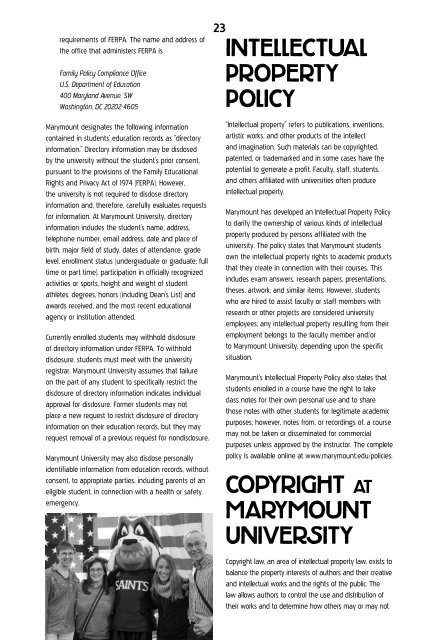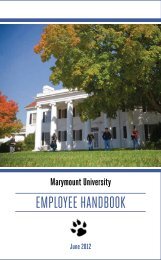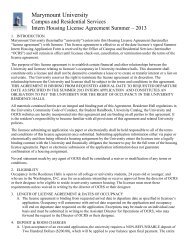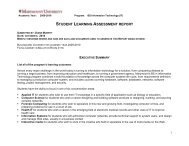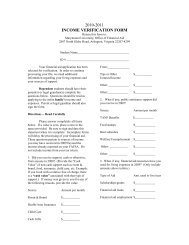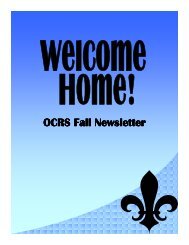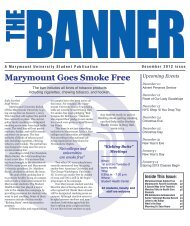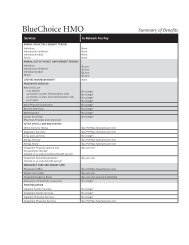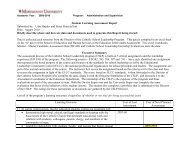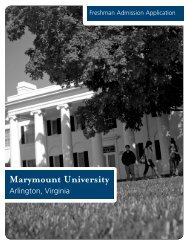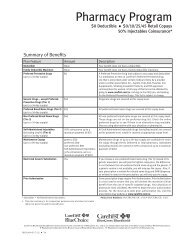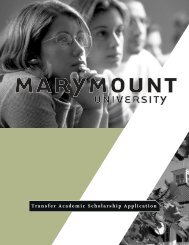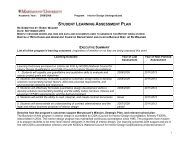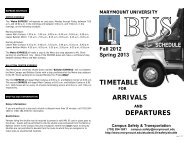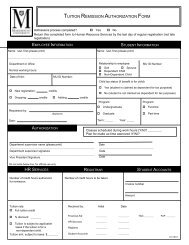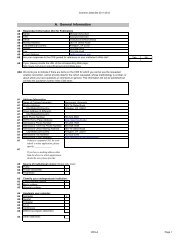Student Handbook - Marymount University
Student Handbook - Marymount University
Student Handbook - Marymount University
You also want an ePaper? Increase the reach of your titles
YUMPU automatically turns print PDFs into web optimized ePapers that Google loves.
equirements of FERPA. The name and address of<br />
the office that administers FERPA is<br />
Family Policy Compliance Office<br />
U.S. Department of Education<br />
400 Maryland Avenue, SW<br />
Washington, DC 20202-4605<br />
<strong>Marymount</strong> designates the following information<br />
contained in students’ education records as “directory<br />
information.” Directory information may be disclosed<br />
by the university without the student’s prior consent,<br />
pursuant to the provisions of the Family Educational<br />
Rights and Privacy Act of 1974 (FERPA). However,<br />
the university is not required to disclose directory<br />
information and, therefore, carefully evaluates requests<br />
for information. At <strong>Marymount</strong> <strong>University</strong>, directory<br />
information includes the student’s name, address,<br />
telephone number, email address, date and place of<br />
birth, major field of study, dates of attendance, grade<br />
level, enrollment status (undergraduate or graduate; full<br />
time or part time), participation in officially recognized<br />
activities or sports, height and weight of student<br />
athletes, degrees, honors (including Dean’s List) and<br />
awards received, and the most recent educational<br />
agency or institution attended.<br />
Currently enrolled students may withhold disclosure<br />
of directory information under FERPA. To withhold<br />
disclosure, students must meet with the university<br />
registrar. <strong>Marymount</strong> <strong>University</strong> assumes that failure<br />
on the part of any student to specifically restrict the<br />
disclosure of directory information indicates individual<br />
approval for disclosure. Former students may not<br />
place a new request to restrict disclosure of directory<br />
information on their education records, but they may<br />
request removal of a previous request for nondisclosure.<br />
<strong>Marymount</strong> <strong>University</strong> may also disclose personally<br />
identifiable information from education records, without<br />
consent, to appropriate parties, including parents of an<br />
eligible student, in connection with a health or safety<br />
emergency.<br />
23<br />
Intellectual<br />
Property<br />
Policy<br />
“Intellectual property” refers to publications, inventions,<br />
artistic works, and other products of the intellect<br />
and imagination. Such materials can be copyrighted,<br />
patented, or trademarked and in some cases have the<br />
potential to generate a profit. Faculty, staff, students,<br />
and others affiliated with universities often produce<br />
intellectual property.<br />
<strong>Marymount</strong> has developed an Intellectual Property Policy<br />
to clarify the ownership of various kinds of intellectual<br />
property produced by persons affiliated with the<br />
university. The policy states that <strong>Marymount</strong> students<br />
own the intellectual property rights to academic products<br />
that they create in connection with their courses. This<br />
includes exam answers, research papers, presentations,<br />
theses, artwork, and similar items. However, students<br />
who are hired to assist faculty or staff members with<br />
research or other projects are considered university<br />
employees; any intellectual property resulting from their<br />
employment belongs to the faculty member and/or<br />
to <strong>Marymount</strong> <strong>University</strong>, depending upon the specific<br />
situation.<br />
<strong>Marymount</strong>’s Intellectual Property Policy also states that<br />
students enrolled in a course have the right to take<br />
class notes for their own personal use and to share<br />
those notes with other students for legitimate academic<br />
purposes; however, notes from, or recordings of, a course<br />
may not be taken or disseminated for commercial<br />
purposes unless approved by the instructor. The complete<br />
policy is available online at www.marymount.edu/policies.<br />
Copyright at<br />
<strong>Marymount</strong><br />
<strong>University</strong><br />
Copyright law, an area of intellectual property law, exists to<br />
balance the property interests of authors and their creative<br />
and intellectual works and the rights of the public. The<br />
law allows authors to control the use and distribution of<br />
their works and to determine how others may or may not


